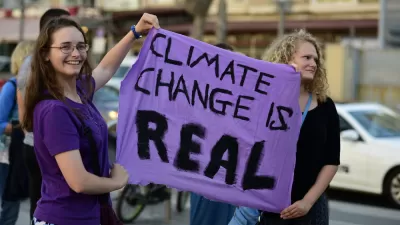By the usual measures, wealthy "consumer cities" have largely put a check on their carbon emissions. But that doesn't account for the emissions that their consumption habits fuel in other places.

Citing the hefty figure of 60 percent, Stephen Leahy writes that "The world's cities emit 70 percent of the world’s carbon dioxide—and that's likely higher when consumption emissions are included."
The finding comes from a report released at the IPCC Cities and Climate Change Science Conference. The "vitality" of wealthy cities, the report says, gives rise to significant greenhouse gas emissions outside their boundaries. Leahy writes, "when the emissions associated with their consumption of goods and services are included, these cities' emissions have grown substantially and are among the highest in the world on a per person basis, the report says."
Measuring emissions only by what originates within city limits paints a rosy picture of "consumer cities" and may unfairly vilify the places that produce those goods. As Cleveland sustainability chief Matt Gray argued to The National Geographic, "Resource consumption was not a factor in last year's U.S. Cities Sustainable Development Goals Index, which put Cleveland at the bottom. Yet the fact that Cleveland is widely considered a national leader in local food production wasn't a factor in the index [...]"
FULL STORY: Cities Emit 60% More Carbon Than Thought

Maui's Vacation Rental Debate Turns Ugly
Verbal attacks, misinformation campaigns and fistfights plague a high-stakes debate to convert thousands of vacation rentals into long-term housing.

Planetizen Federal Action Tracker
A weekly monitor of how Trump’s orders and actions are impacting planners and planning in America.

In Urban Planning, AI Prompting Could be the New Design Thinking
Creativity has long been key to great urban design. What if we see AI as our new creative partner?

King County Supportive Housing Program Offers Hope for Unhoused Residents
The county is taking a ‘Housing First’ approach that prioritizes getting people into housing, then offering wraparound supportive services.

Researchers Use AI to Get Clearer Picture of US Housing
Analysts are using artificial intelligence to supercharge their research by allowing them to comb through data faster. Though these AI tools can be error prone, they save time and housing researchers are optimistic about the future.

Making Shared Micromobility More Inclusive
Cities and shared mobility system operators can do more to include people with disabilities in planning and operations, per a new report.
Urban Design for Planners 1: Software Tools
This six-course series explores essential urban design concepts using open source software and equips planners with the tools they need to participate fully in the urban design process.
Planning for Universal Design
Learn the tools for implementing Universal Design in planning regulations.
planning NEXT
Appalachian Highlands Housing Partners
Mpact (founded as Rail~Volution)
City of Camden Redevelopment Agency
City of Astoria
City of Portland
City of Laramie





























